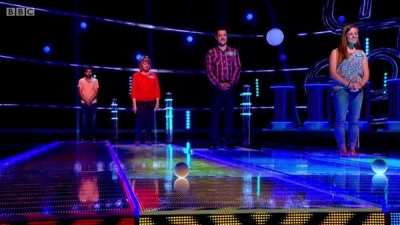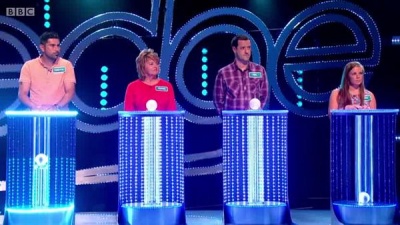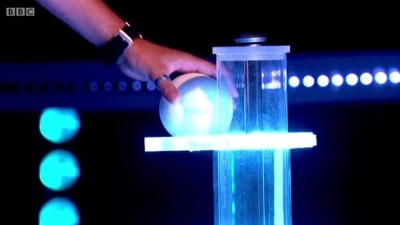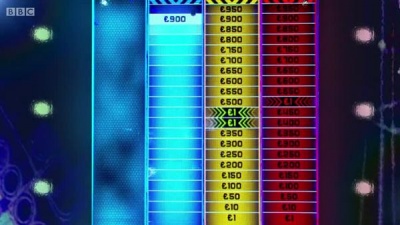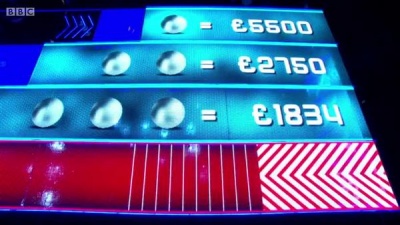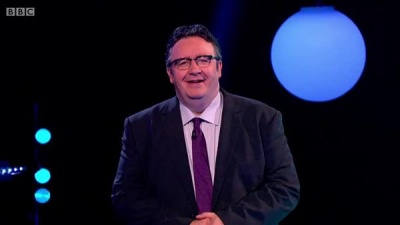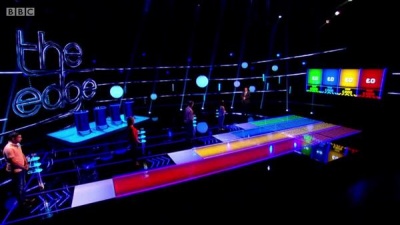Weaver's Week 2015-04-26
Last week | Weaver's Week Index | Next week
"A quiz show for clever accountants and their wives."
Contents |
Brain of Britain
BBC Entertainment Salford for Radio 4
The final
The opening question was a quote about Ask the Family, best remembered with perpetual BoB host Robert Robinson. Brian Chesney got that question, and tied for the lead with Nigel Jones after the first round.
"Five in a row!" Words to strike fear into every opponent; Mr. Chesney took five on his own, not letting the other players score. Precision pays in the final; Nigel Jones answered "you want your servants to read" on a question about the Lady Chatterly's Lover trial. Mr. Chesney took "you want your wife or your servants to read" for a bonus, and a 10-4 lead.
Game over? Not a bit of it. The gap halved in round three, to 12-9; Mr. Chesney took one and a bonus, Mr. Jones three and two bonuses. A blank for Mr. Chesney in the next round allowed Mr. Jones to close it to 12-11.
Mr. Chesney hit back with another Five in a row, assisted by the name of Hayden's 8th symphony – after "le matin" and "le midi" comes "le soir", obvs. The cry of the kittiwake and the tones of Lord Rockingham's XI helped Nigel Jones remain in touch, trailing 19-17 going into the final round.
"Liberal and Social Democrats" was not the original name of that other lot with Nick Clegg. No, it was the "Social and Liberal Democrats", the "Democrats" on second reference, the "Salads" informally. By giving the wrong answer, Mr. Chesney fails to score in his round, but Mr. Jones picks up a bonus with Luxembourg, and scores one, two, three on his own set. Mr. Chesney can tie the game if he knows what a "lakh" is, because Mr. Jones' offer was wrong, but so is Mr. Chesney's guess. Not 10,000, not 500, but 100,000.
And that's the game. The final scores:
- David Good – 3
- Neil Wright – 5
- Brian Chesney – 20
- Nigel Jones – 21
By the narrowest margin, Nigel Jones is the winner.
Mr. Jones receives the silver salver as the credits roll, and host Russell Davies reminds us that applications for Brain of Britain 2016 are already open.
The Edge
BBC Entertainment for BBC 1, dates – 17 April
What is it with daytime quizzes and painfully short titles these days? It started with Pointless and Perfection (both encapsulated the programme in a single word), got more obscure with Breakaway and Pressure Pad. Now we've got The Link and The Edge, both programmes named after their scoring mechanism.
Anyway. The Edge was promoted as the logical cross between quiz and bowls. The title Quiz Bowl has already been used, a one-shot quiz between newspaper journalists, loosely based on American football.
What sort of bowling? Not ten-pin, nothing is to be knocked over. Not quite lawn bowls, there's no way to turn the ball left or right. It's simple target bowls, get as close as possible to the titular Edge without the ball actually falling over said Edge. Not so much bowling, more shove ha'penny?
Four players attend the show. Each stands behind a BBC daytime podium, in front of a set lit in the BBC daytime colours of black and black. The programme begins with a quiz round, simple general knowledge question with a simple answer. The rules of Bob's Full House apply: buzz in and get a question wrong and you're wallied, can't answer the next question.
First to give four answers wins. Not the chance to bowl straight away, but the first choice of four lanes on which to bowl. The lanes are narrow, and protected by rails so balls cannot roll out. They are of different lengths, but each ends in 20 narrow strips, each a few inches wide. Narrow, but about twice the size of the ball. These strips are marked with money, starting at £1, then £10, £50, £100, and rising by £50 to £900, £950, and the titular Edge, initially worth £1000. There's nothing if the ball falls over the edge.
After this opening round of questions, each person gets one ball to bowl. Whoever scores the lowest is eliminated with nothing. Though players pick their lane, the play is always shortest to longest, so many round winners pick a longer lane so they know what they're aiming for.
But we get ahead of ourselves: only one player has scored four answers, and picked a lane. The quiz continues, but rather than continuing to light the four corners of the bingo card, all the scores are reset. We might have spent minutes going through more than a dozen questions, had a 4-3-3-3 result, and now we're back to square one.
Though host Mark Benton tries to jolly the game along, he cannot spin out the bowling for more than a few minutes. There's been a huge amount of quiz and introduction and waffle, typically it's ten minutes into the programme before anyone picks up a ball, and then it's all gone in moments. (If there's a tie, there's a one-ball bowl-off, closest to the edge without going over wins.)
Whoever bowled off the edge, or scored the least dosh, is off the show. So is the shortest lane, closed for the rest of the show like a tiddly little hill on The Jump. The quizzing resumes for the three remaining players, but with a gimmick. Each answer in this round comes in two parts: the two people to have done something, a two-word phrase. Four correct answers gives choice of the lanes, and again the scores reset after one player has won the round.
Finally, there's a good chunk of bowling to be done. Each player will chuck two balls up their lane. The first player to qualify has the standard lane. The second will have one "danger zone" assigned at random, replacing the usual value with £1. The last player has two "danger zones" assigned. With the titular Edge worth £2000, and nothing for dropping off the edge, the lowest total score leaves the game.
Round three, a bit like round two. Three part answers to the questions, first to four wins pick of the two remaining lanes, and gets to set one "danger zone" for their opponent. Three bowls each, lower total leaves, and the one player remains.
Before the final bowl, there's a timed round of questions. 75 seconds, four parts to each. Every correct answer extends the titular Edge by one of the cash zones: five right answers and the Edge is now about two feet long.
The player's able to choose their risk: get it in one for all the money they've built up in the earlier rounds. Or take two balls for half the cash, or take three for a third of the money. It can be done, and there were some agonisingly close calls.
We have a number of problems with this show. The biggest: it's a show about bowling. Why are we waiting ten minutes to actually get some bowling? That's like having the big machine on Tipping Point, and not putting a single counter in before the first ad break.
We'd change this opening completely. First right answer allows a player to choose a lane, and no-one else can pick that lane while the player stands there. Second right answer lets them bowl a ball, or swap to an open lane. Wrong answer returns the player to their starting podium so another player might pick their lane. After (say) twenty questions, quiz off for the remaining lanes, then everyone bowls one last time.
Rounds two and three feature "danger zones". Again, we're not fans, it's an extra complication in a game that's already too difficult. There isn't enough bowling to begin with – between 17 and 19 throws in the entire show, Tipping Point has more counters in before half-way. Worse, a miss is a miss, it doesn't add anything to a Misspot or promise extra action later.
We do like the increase in the number of answers required each round, and we do agree that there needs to be some variety between the elimination rounds – our idea would not be interesting for rounds 1, 2, and 3. We don't like the fact that the £1 zone starts at the player's feet: if another player has bust, someone could literally drop the ball, score £1, and go through even though it's miles away from the titular edge. Yes to a long £1 zone, no to an infinite one.
There are many ways to give an advantage in the final round. Earn balls, add to the jackpot, earn a shorter lane, have obstacles to be removed. Making the edge larger is one tactic amongst many, and seems to go against the show's central premise. Players are asked to land the ball in a minuscule space, until the final, where they're asked to land it in a much larger space.
Mark Benton has two catchphrases, both suitable for the Game Show Dictionary of Forced Catchphrases. "The game show with brains – and balls", a statement of the blindingly obvious. "Let's roll", he says, before every single bowl. Every time a player picks up a ball. Every. Single. Time. Gaaah!
Our conclusion is that there's a workable format in here, but this series hasn't shown it. It's a long, slow, dull start – a whole lot of quiz that only determines playing order, the winner is decided on the bowling rink. Come in to the programme after 20 minutes, late in round 2, and they've got the balance about right. Like Take on the Twisters, the show is centred on a gimmick they're not using.
It's Debateable
A series of short pieces somewhere between game shows and British politics.
13) Gladiators
The SNP launched their manifesto from a wall this week.
Already, the Gladiators have claimed four victims. Harvie clung to the wall like ivy, no match for the leaping Salmond. Rennie made good progress, but then fell off. Cockburn suffered an embarrassing injury. Davidson clung on for five points, bucking wildly as she tried to shake off her opponent Solero; the broad smiles showed both contender and Gladiator enjoyed the experience.
Now the final contender faces his nemesis. Over to John Anderson.
- Murphy! You will go on my first whistle.
- Sturgeon! You will go on my second whistle.
This Week and Next
Masterchef also reached its end this week. We should probably put a bit of text spoiler space, so it's not entirely clear who won the contest lest some of our readers are going to watch the show on catchup, or in repeats on BBC2 later in the year, or on UKTV Food in three year's time. Perhaps we might note that this year's series has had shows on every night of the week, except Saturday. Anyway, Simon Wood took the crown, and was told "What you have learned is lunacy." Er, if you say so, Gregg (or was it John?)
BARB ratings in the week to 12 April, containing Easter Monday.
- Britain's Got Talent came back with 8.6m viewers, the week's biggest show.
- Masterchef led for BBC1, the Sunday outing scored 5.8m viewers. HIGNFY attracted 5.3m, and Pointless Celebrities 4.5m.
- Ninja Warrior (3.3m) and Play to the Whistle (2.8m) debuted on ITV Saturday nights, while Big Star's Little Star finished with 3.15m.
- University Challenge pulled 2.75m on Easter Monday, but 4.1m saw the Boat Race spin-off on Saturday. 4.44m saw the Grand National horse race on Channel 4, and Celebrity Fifteen-to-One straight afterwards retained 1.25m viewers.
- A good week for ITV2: 1.55m for Britain's Got More Talent, 1.25m for Celebrity Juice, 735,000 for the Sunday teatime repeat of BGT. We learned that about 85,000 people play along with In It to Win It on Superer Ceefax 601.
We've a new run of The 3rd Degree (Radio 4, Mon), a new run of Munud i Fynd (S4C, Thu), and the final of The Voice of Holland of Ireland (RTE1, Sun). Who's on Pointless Celebrities (BBC1, Sat)? Only John Craven, Shauna Lowry, Miranda Krestovnikoff, Radzi Chinyanganya, and Helen Skelton.
Photo credits: BBC Entertainment, Jamie Ross.
To have Weaver's Week emailed to you on publication day, receive our exclusive TV roundup of the game shows in the week ahead, and chat to other ukgameshows.com readers, sign up to our Yahoo! Group.


